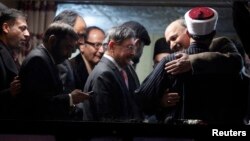ISLAMABAD —
Pakistan's coalition government on Thursday negotiated an end to a four-day protest in the nation's capital led by firebrand cleric Tahir-ul Qadri against the country's political leadership.
Thousands of supporters danced and burst burst into cheers as Tahir-ul Qadri, a Canadian-Pakistani cleric whose protest challenged the country's political establishment, said he had reached a deal with the government.
He called the agreement "a great document in the history of Pakistan's democracy," he said.
The Islamabad Declaration
Signed by Qadri and Prime Minister Raja Pervez Ashraf, the so-called "Islamabad Declaration" states the National Assembly may be dissolved in favor of an interim government a few days before its term is set to end on March 15.
Qadri said that would allow for 90 days until the vote for a new parliament is held - time to vet those politicians standing for elections.
The face-saving deal was forged after Qadri held hours of talks with a delegation of political leaders who joined the cleric in his bullet-proof container truck in the middle of the protesting crowds.
Analyst Rasul Bakhsh Rais said Qadri's message was not new, but his street tactics set a negative precedent for the country.
"Almost every day in some part of the country simultaneously, many protests take place in this country and if that is going to be in Islamabad again and again, I don’t think we are going to have a democratic stability or political stability in this country," said Rais.
Under the slogan of "Change," the cleric demanded radical reforms to the country's electoral system, to prevent what he called the perpetuation of a corrupt and incompetent political leadership.
Pakistan's political opposition parties refused to join the sit-in. But Qadri's staying power, and his ability to tap into popular discontent with energy shortages, unemployment, and corruption, finally brought the government to the negotiating table.
For some, like supporter Hasnain Ali, that was victory enough. He said, "Our message now has reached the world, and the start of dialogue is our victory. We want to change the system and our leader has started this change."
He said all of Pakistan is with Qadri, adding that "we will stay here until we achieve victory."
President Asif Ali Zardari on Thursday summoned a meeting of the National Assembly for Monday, January 21.
The protest was the longest single political rally in Pakistan's history, and shut down the capital's main business district for four days. Demonstrators equipped with blankets and tents sat through cold nights and rain, refusing to leave until their leader's demands were met.
Qadri kept a tight rein on the protest. The cleric had his own security teams secure access to the avenue, conducting body searchers and demanding identification of anyone who tried to enter the area.
Thousands of police and armed paramilitary rangers had remained on alert in case the estimated 50,000 protestors had tried to break through the barricade of metal containers protecting the nation's parliament building.
Thousands of supporters danced and burst burst into cheers as Tahir-ul Qadri, a Canadian-Pakistani cleric whose protest challenged the country's political establishment, said he had reached a deal with the government.
He called the agreement "a great document in the history of Pakistan's democracy," he said.
The Islamabad Declaration
Signed by Qadri and Prime Minister Raja Pervez Ashraf, the so-called "Islamabad Declaration" states the National Assembly may be dissolved in favor of an interim government a few days before its term is set to end on March 15.
Qadri said that would allow for 90 days until the vote for a new parliament is held - time to vet those politicians standing for elections.
The face-saving deal was forged after Qadri held hours of talks with a delegation of political leaders who joined the cleric in his bullet-proof container truck in the middle of the protesting crowds.
Analyst Rasul Bakhsh Rais said Qadri's message was not new, but his street tactics set a negative precedent for the country.
"Almost every day in some part of the country simultaneously, many protests take place in this country and if that is going to be in Islamabad again and again, I don’t think we are going to have a democratic stability or political stability in this country," said Rais.
Under the slogan of "Change," the cleric demanded radical reforms to the country's electoral system, to prevent what he called the perpetuation of a corrupt and incompetent political leadership.
Pakistan's political opposition parties refused to join the sit-in. But Qadri's staying power, and his ability to tap into popular discontent with energy shortages, unemployment, and corruption, finally brought the government to the negotiating table.
For some, like supporter Hasnain Ali, that was victory enough. He said, "Our message now has reached the world, and the start of dialogue is our victory. We want to change the system and our leader has started this change."
He said all of Pakistan is with Qadri, adding that "we will stay here until we achieve victory."
President Asif Ali Zardari on Thursday summoned a meeting of the National Assembly for Monday, January 21.
The protest was the longest single political rally in Pakistan's history, and shut down the capital's main business district for four days. Demonstrators equipped with blankets and tents sat through cold nights and rain, refusing to leave until their leader's demands were met.
Qadri kept a tight rein on the protest. The cleric had his own security teams secure access to the avenue, conducting body searchers and demanding identification of anyone who tried to enter the area.
Thousands of police and armed paramilitary rangers had remained on alert in case the estimated 50,000 protestors had tried to break through the barricade of metal containers protecting the nation's parliament building.






